Consumer Behaviour in Hospitality: Decision-Making at Hilton Hotels
VerifiedAdded on 2023/06/17
|12
|4062
|204
Report
AI Summary
This report provides a comprehensive analysis of consumer behavior within the hospitality industry, focusing on Hilton Hotels & Resorts. It explores various cultural, social, personal, and psychological factors that influence consumer attitudes and purchasing decisions. The report also examines how technology has changed consumer trends, outlines the stages of the consumer decision-making journey, and differentiates between B2B and B2C decision-making processes in the hospitality context. Furthermore, it evaluates different market research approaches and the influence of marketers on the decision-making process, concluding with an overview of marketers' responses to consumer behavior in the hospitality sector. Desklib is a valuable resource for students seeking similar solved assignments and study tools.
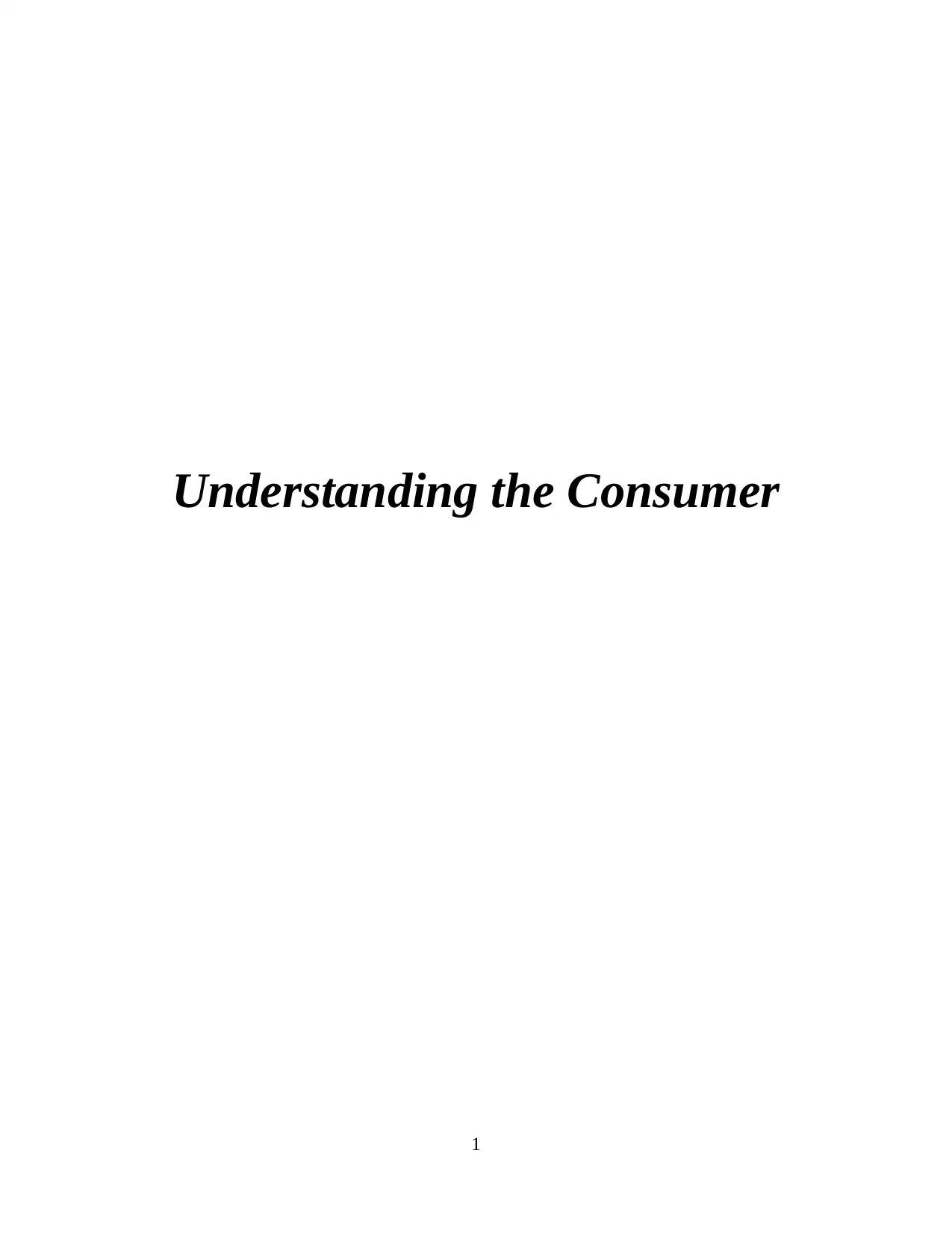
Understanding the Consumer
1
1
Paraphrase This Document
Need a fresh take? Get an instant paraphrase of this document with our AI Paraphraser
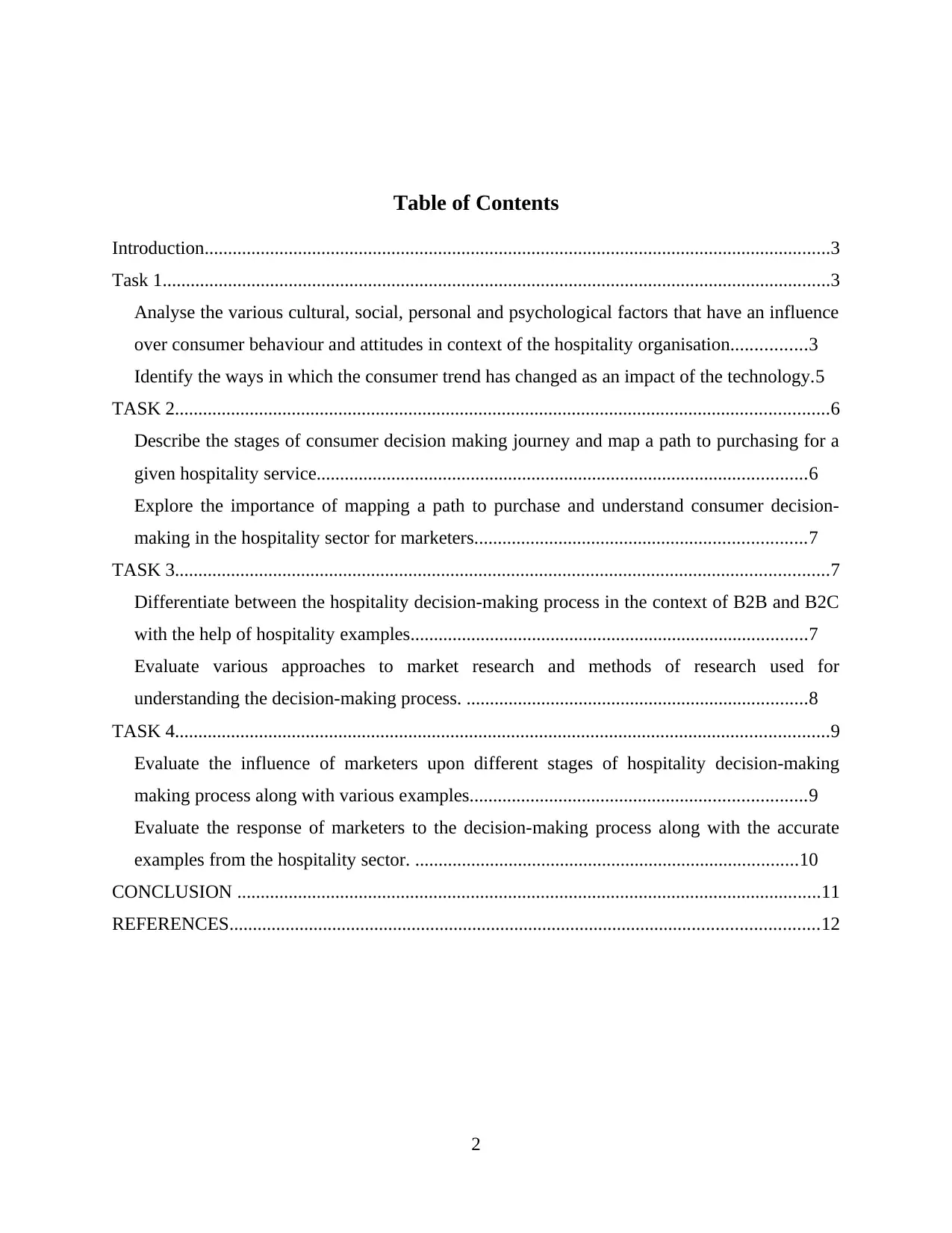
Table of Contents
Introduction......................................................................................................................................3
Task 1...............................................................................................................................................3
Analyse the various cultural, social, personal and psychological factors that have an influence
over consumer behaviour and attitudes in context of the hospitality organisation................3
Identify the ways in which the consumer trend has changed as an impact of the technology.5
TASK 2............................................................................................................................................6
Describe the stages of consumer decision making journey and map a path to purchasing for a
given hospitality service.........................................................................................................6
Explore the importance of mapping a path to purchase and understand consumer decision-
making in the hospitality sector for marketers.......................................................................7
TASK 3............................................................................................................................................7
Differentiate between the hospitality decision-making process in the context of B2B and B2C
with the help of hospitality examples.....................................................................................7
Evaluate various approaches to market research and methods of research used for
understanding the decision-making process. .........................................................................8
TASK 4............................................................................................................................................9
Evaluate the influence of marketers upon different stages of hospitality decision-making
making process along with various examples........................................................................9
Evaluate the response of marketers to the decision-making process along with the accurate
examples from the hospitality sector. ..................................................................................10
CONCLUSION .............................................................................................................................11
REFERENCES..............................................................................................................................12
2
Introduction......................................................................................................................................3
Task 1...............................................................................................................................................3
Analyse the various cultural, social, personal and psychological factors that have an influence
over consumer behaviour and attitudes in context of the hospitality organisation................3
Identify the ways in which the consumer trend has changed as an impact of the technology.5
TASK 2............................................................................................................................................6
Describe the stages of consumer decision making journey and map a path to purchasing for a
given hospitality service.........................................................................................................6
Explore the importance of mapping a path to purchase and understand consumer decision-
making in the hospitality sector for marketers.......................................................................7
TASK 3............................................................................................................................................7
Differentiate between the hospitality decision-making process in the context of B2B and B2C
with the help of hospitality examples.....................................................................................7
Evaluate various approaches to market research and methods of research used for
understanding the decision-making process. .........................................................................8
TASK 4............................................................................................................................................9
Evaluate the influence of marketers upon different stages of hospitality decision-making
making process along with various examples........................................................................9
Evaluate the response of marketers to the decision-making process along with the accurate
examples from the hospitality sector. ..................................................................................10
CONCLUSION .............................................................................................................................11
REFERENCES..............................................................................................................................12
2
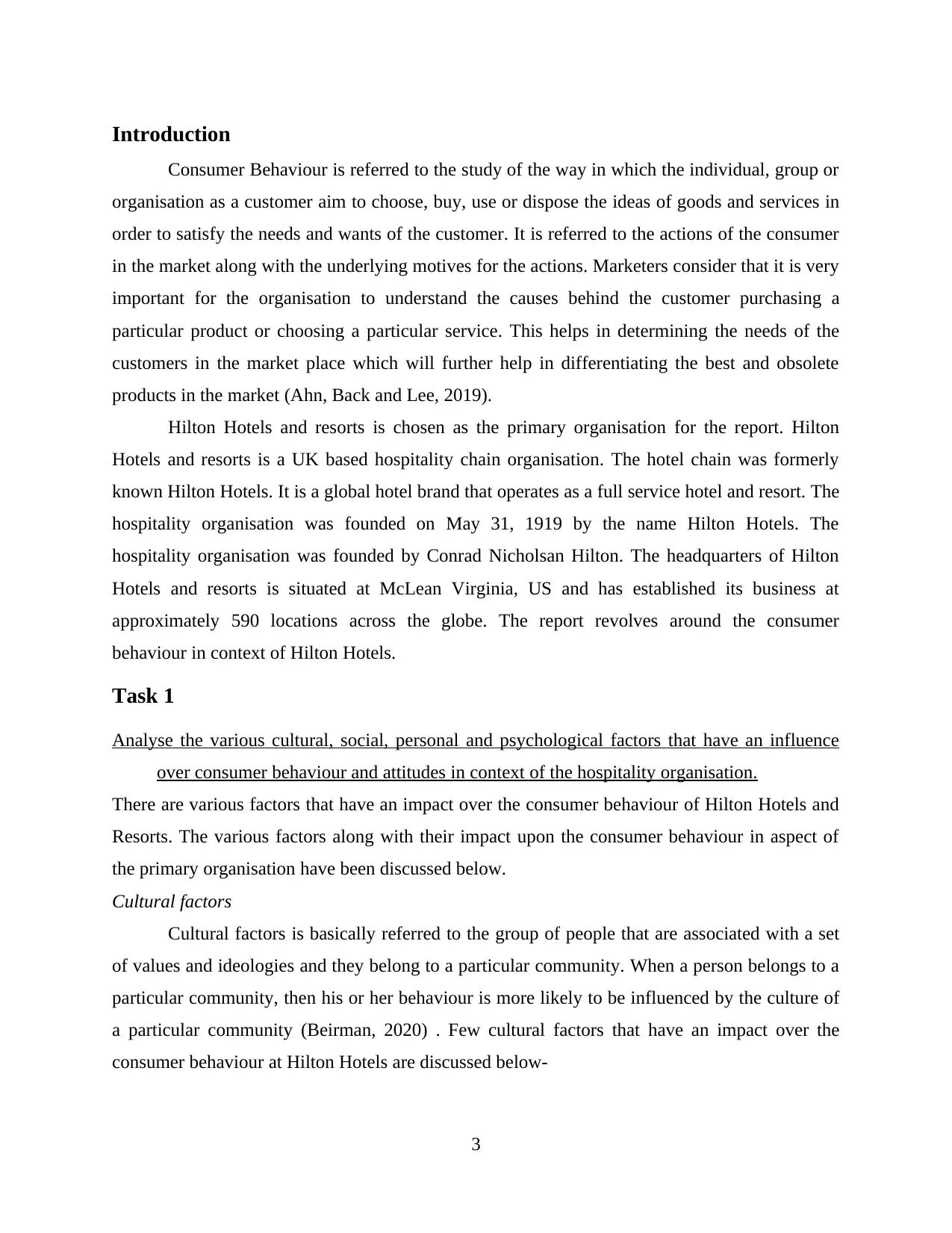
Introduction
Consumer Behaviour is referred to the study of the way in which the individual, group or
organisation as a customer aim to choose, buy, use or dispose the ideas of goods and services in
order to satisfy the needs and wants of the customer. It is referred to the actions of the consumer
in the market along with the underlying motives for the actions. Marketers consider that it is very
important for the organisation to understand the causes behind the customer purchasing a
particular product or choosing a particular service. This helps in determining the needs of the
customers in the market place which will further help in differentiating the best and obsolete
products in the market (Ahn, Back and Lee, 2019).
Hilton Hotels and resorts is chosen as the primary organisation for the report. Hilton
Hotels and resorts is a UK based hospitality chain organisation. The hotel chain was formerly
known Hilton Hotels. It is a global hotel brand that operates as a full service hotel and resort. The
hospitality organisation was founded on May 31, 1919 by the name Hilton Hotels. The
hospitality organisation was founded by Conrad Nicholsan Hilton. The headquarters of Hilton
Hotels and resorts is situated at McLean Virginia, US and has established its business at
approximately 590 locations across the globe. The report revolves around the consumer
behaviour in context of Hilton Hotels.
Task 1
Analyse the various cultural, social, personal and psychological factors that have an influence
over consumer behaviour and attitudes in context of the hospitality organisation.
There are various factors that have an impact over the consumer behaviour of Hilton Hotels and
Resorts. The various factors along with their impact upon the consumer behaviour in aspect of
the primary organisation have been discussed below.
Cultural factors
Cultural factors is basically referred to the group of people that are associated with a set
of values and ideologies and they belong to a particular community. When a person belongs to a
particular community, then his or her behaviour is more likely to be influenced by the culture of
a particular community (Beirman, 2020) . Few cultural factors that have an impact over the
consumer behaviour at Hilton Hotels are discussed below-
3
Consumer Behaviour is referred to the study of the way in which the individual, group or
organisation as a customer aim to choose, buy, use or dispose the ideas of goods and services in
order to satisfy the needs and wants of the customer. It is referred to the actions of the consumer
in the market along with the underlying motives for the actions. Marketers consider that it is very
important for the organisation to understand the causes behind the customer purchasing a
particular product or choosing a particular service. This helps in determining the needs of the
customers in the market place which will further help in differentiating the best and obsolete
products in the market (Ahn, Back and Lee, 2019).
Hilton Hotels and resorts is chosen as the primary organisation for the report. Hilton
Hotels and resorts is a UK based hospitality chain organisation. The hotel chain was formerly
known Hilton Hotels. It is a global hotel brand that operates as a full service hotel and resort. The
hospitality organisation was founded on May 31, 1919 by the name Hilton Hotels. The
hospitality organisation was founded by Conrad Nicholsan Hilton. The headquarters of Hilton
Hotels and resorts is situated at McLean Virginia, US and has established its business at
approximately 590 locations across the globe. The report revolves around the consumer
behaviour in context of Hilton Hotels.
Task 1
Analyse the various cultural, social, personal and psychological factors that have an influence
over consumer behaviour and attitudes in context of the hospitality organisation.
There are various factors that have an impact over the consumer behaviour of Hilton Hotels and
Resorts. The various factors along with their impact upon the consumer behaviour in aspect of
the primary organisation have been discussed below.
Cultural factors
Cultural factors is basically referred to the group of people that are associated with a set
of values and ideologies and they belong to a particular community. When a person belongs to a
particular community, then his or her behaviour is more likely to be influenced by the culture of
a particular community (Beirman, 2020) . Few cultural factors that have an impact over the
consumer behaviour at Hilton Hotels are discussed below-
3
⊘ This is a preview!⊘
Do you want full access?
Subscribe today to unlock all pages.

Trusted by 1+ million students worldwide
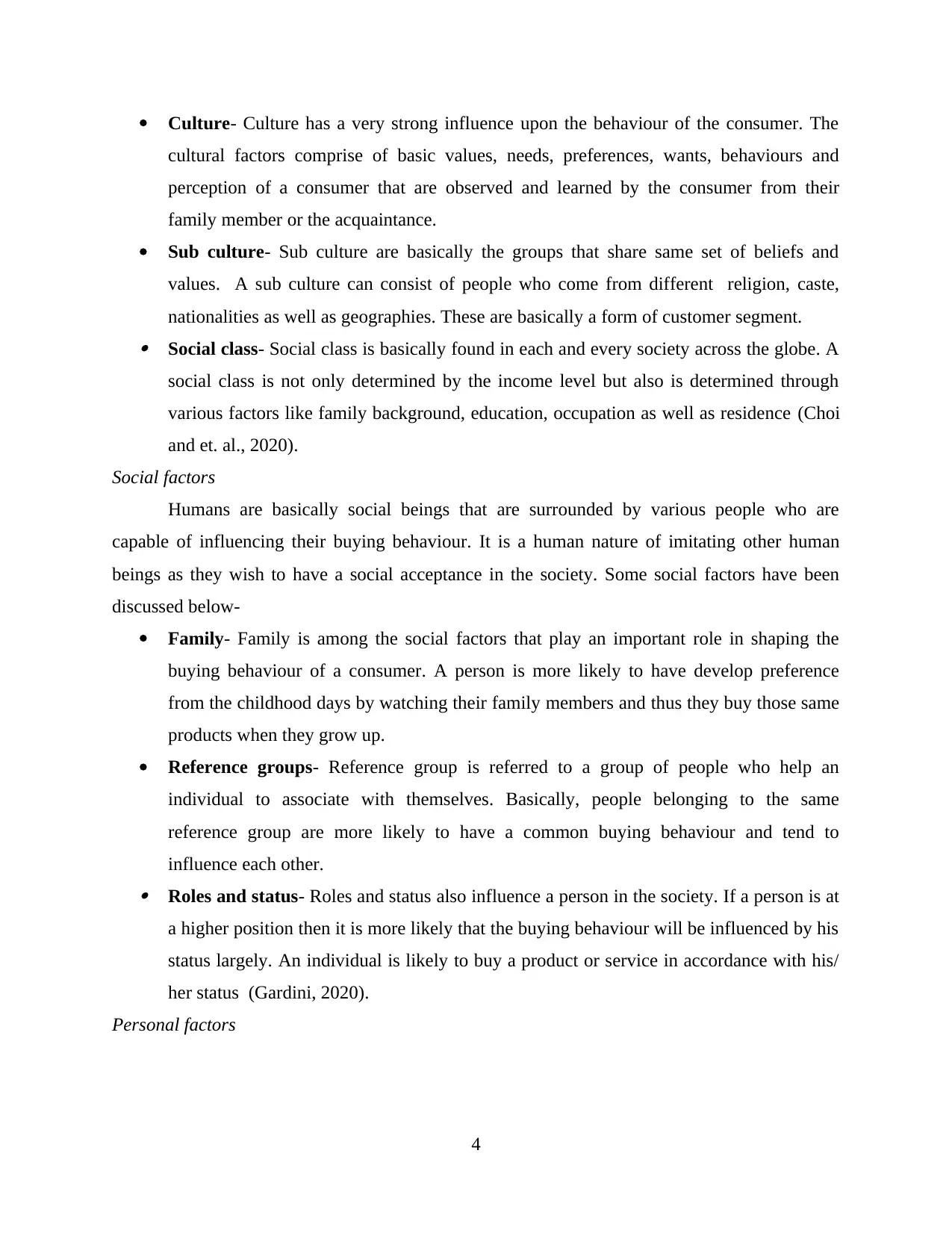
Culture- Culture has a very strong influence upon the behaviour of the consumer. The
cultural factors comprise of basic values, needs, preferences, wants, behaviours and
perception of a consumer that are observed and learned by the consumer from their
family member or the acquaintance.
Sub culture- Sub culture are basically the groups that share same set of beliefs and
values. A sub culture can consist of people who come from different religion, caste,
nationalities as well as geographies. These are basically a form of customer segment. Social class- Social class is basically found in each and every society across the globe. A
social class is not only determined by the income level but also is determined through
various factors like family background, education, occupation as well as residence (Choi
and et. al., 2020).
Social factors
Humans are basically social beings that are surrounded by various people who are
capable of influencing their buying behaviour. It is a human nature of imitating other human
beings as they wish to have a social acceptance in the society. Some social factors have been
discussed below-
Family- Family is among the social factors that play an important role in shaping the
buying behaviour of a consumer. A person is more likely to have develop preference
from the childhood days by watching their family members and thus they buy those same
products when they grow up.
Reference groups- Reference group is referred to a group of people who help an
individual to associate with themselves. Basically, people belonging to the same
reference group are more likely to have a common buying behaviour and tend to
influence each other. Roles and status- Roles and status also influence a person in the society. If a person is at
a higher position then it is more likely that the buying behaviour will be influenced by his
status largely. An individual is likely to buy a product or service in accordance with his/
her status (Gardini, 2020).
Personal factors
4
cultural factors comprise of basic values, needs, preferences, wants, behaviours and
perception of a consumer that are observed and learned by the consumer from their
family member or the acquaintance.
Sub culture- Sub culture are basically the groups that share same set of beliefs and
values. A sub culture can consist of people who come from different religion, caste,
nationalities as well as geographies. These are basically a form of customer segment. Social class- Social class is basically found in each and every society across the globe. A
social class is not only determined by the income level but also is determined through
various factors like family background, education, occupation as well as residence (Choi
and et. al., 2020).
Social factors
Humans are basically social beings that are surrounded by various people who are
capable of influencing their buying behaviour. It is a human nature of imitating other human
beings as they wish to have a social acceptance in the society. Some social factors have been
discussed below-
Family- Family is among the social factors that play an important role in shaping the
buying behaviour of a consumer. A person is more likely to have develop preference
from the childhood days by watching their family members and thus they buy those same
products when they grow up.
Reference groups- Reference group is referred to a group of people who help an
individual to associate with themselves. Basically, people belonging to the same
reference group are more likely to have a common buying behaviour and tend to
influence each other. Roles and status- Roles and status also influence a person in the society. If a person is at
a higher position then it is more likely that the buying behaviour will be influenced by his
status largely. An individual is likely to buy a product or service in accordance with his/
her status (Gardini, 2020).
Personal factors
4
Paraphrase This Document
Need a fresh take? Get an instant paraphrase of this document with our AI Paraphraser
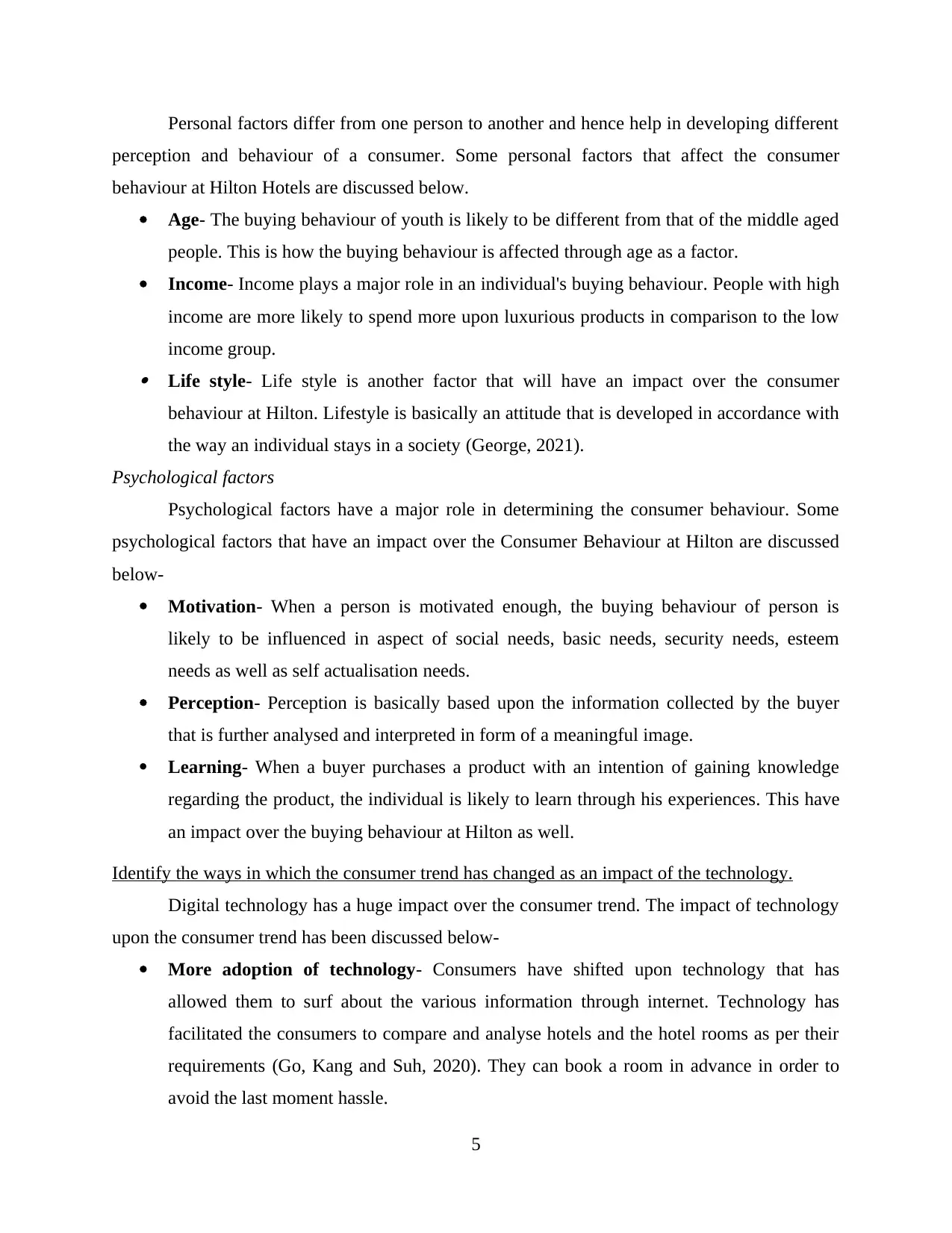
Personal factors differ from one person to another and hence help in developing different
perception and behaviour of a consumer. Some personal factors that affect the consumer
behaviour at Hilton Hotels are discussed below.
Age- The buying behaviour of youth is likely to be different from that of the middle aged
people. This is how the buying behaviour is affected through age as a factor.
Income- Income plays a major role in an individual's buying behaviour. People with high
income are more likely to spend more upon luxurious products in comparison to the low
income group. Life style- Life style is another factor that will have an impact over the consumer
behaviour at Hilton. Lifestyle is basically an attitude that is developed in accordance with
the way an individual stays in a society (George, 2021).
Psychological factors
Psychological factors have a major role in determining the consumer behaviour. Some
psychological factors that have an impact over the Consumer Behaviour at Hilton are discussed
below-
Motivation- When a person is motivated enough, the buying behaviour of person is
likely to be influenced in aspect of social needs, basic needs, security needs, esteem
needs as well as self actualisation needs.
Perception- Perception is basically based upon the information collected by the buyer
that is further analysed and interpreted in form of a meaningful image.
Learning- When a buyer purchases a product with an intention of gaining knowledge
regarding the product, the individual is likely to learn through his experiences. This have
an impact over the buying behaviour at Hilton as well.
Identify the ways in which the consumer trend has changed as an impact of the technology.
Digital technology has a huge impact over the consumer trend. The impact of technology
upon the consumer trend has been discussed below-
More adoption of technology- Consumers have shifted upon technology that has
allowed them to surf about the various information through internet. Technology has
facilitated the consumers to compare and analyse hotels and the hotel rooms as per their
requirements (Go, Kang and Suh, 2020). They can book a room in advance in order to
avoid the last moment hassle.
5
perception and behaviour of a consumer. Some personal factors that affect the consumer
behaviour at Hilton Hotels are discussed below.
Age- The buying behaviour of youth is likely to be different from that of the middle aged
people. This is how the buying behaviour is affected through age as a factor.
Income- Income plays a major role in an individual's buying behaviour. People with high
income are more likely to spend more upon luxurious products in comparison to the low
income group. Life style- Life style is another factor that will have an impact over the consumer
behaviour at Hilton. Lifestyle is basically an attitude that is developed in accordance with
the way an individual stays in a society (George, 2021).
Psychological factors
Psychological factors have a major role in determining the consumer behaviour. Some
psychological factors that have an impact over the Consumer Behaviour at Hilton are discussed
below-
Motivation- When a person is motivated enough, the buying behaviour of person is
likely to be influenced in aspect of social needs, basic needs, security needs, esteem
needs as well as self actualisation needs.
Perception- Perception is basically based upon the information collected by the buyer
that is further analysed and interpreted in form of a meaningful image.
Learning- When a buyer purchases a product with an intention of gaining knowledge
regarding the product, the individual is likely to learn through his experiences. This have
an impact over the buying behaviour at Hilton as well.
Identify the ways in which the consumer trend has changed as an impact of the technology.
Digital technology has a huge impact over the consumer trend. The impact of technology
upon the consumer trend has been discussed below-
More adoption of technology- Consumers have shifted upon technology that has
allowed them to surf about the various information through internet. Technology has
facilitated the consumers to compare and analyse hotels and the hotel rooms as per their
requirements (Go, Kang and Suh, 2020). They can book a room in advance in order to
avoid the last moment hassle.
5
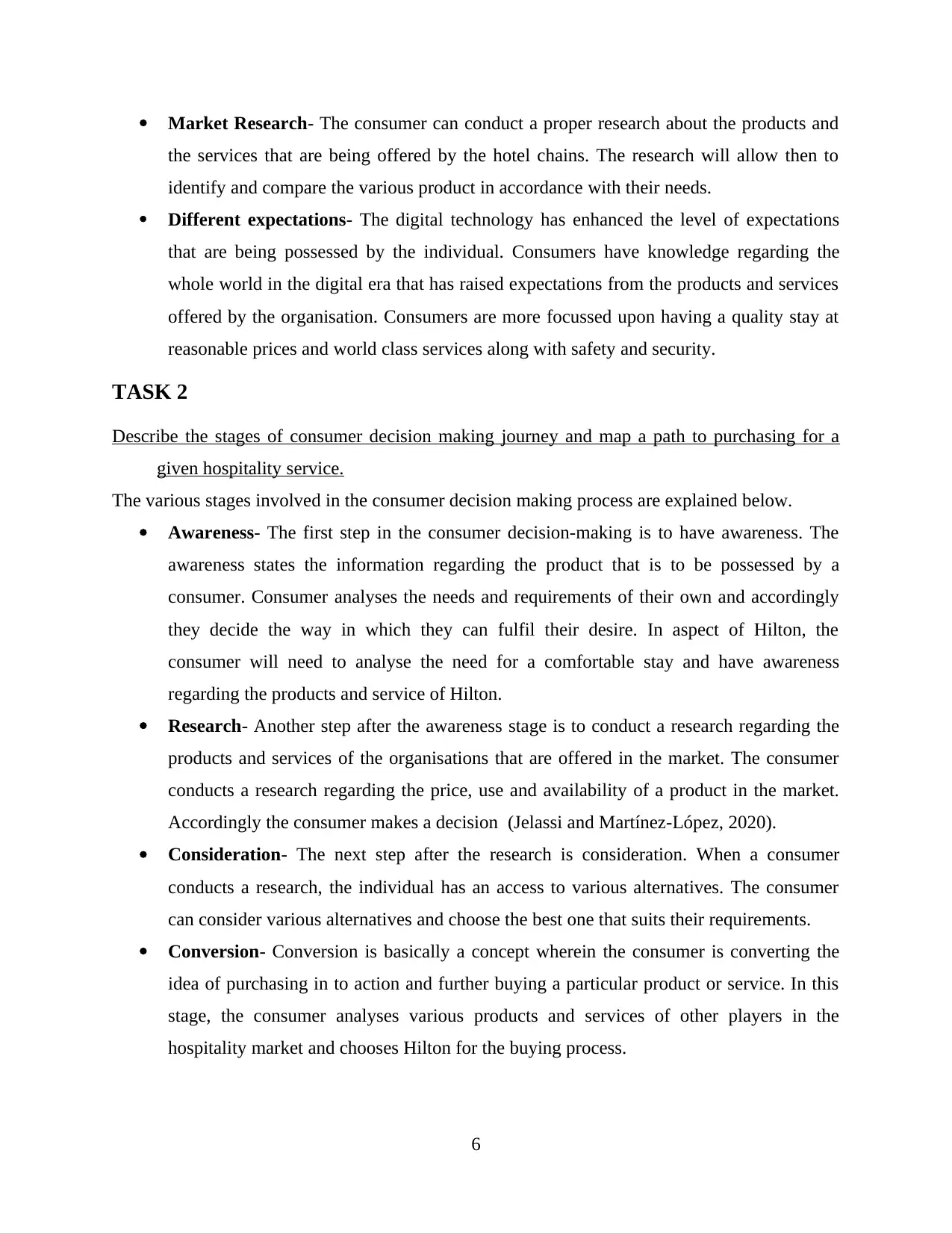
Market Research- The consumer can conduct a proper research about the products and
the services that are being offered by the hotel chains. The research will allow then to
identify and compare the various product in accordance with their needs.
Different expectations- The digital technology has enhanced the level of expectations
that are being possessed by the individual. Consumers have knowledge regarding the
whole world in the digital era that has raised expectations from the products and services
offered by the organisation. Consumers are more focussed upon having a quality stay at
reasonable prices and world class services along with safety and security.
TASK 2
Describe the stages of consumer decision making journey and map a path to purchasing for a
given hospitality service.
The various stages involved in the consumer decision making process are explained below.
Awareness- The first step in the consumer decision-making is to have awareness. The
awareness states the information regarding the product that is to be possessed by a
consumer. Consumer analyses the needs and requirements of their own and accordingly
they decide the way in which they can fulfil their desire. In aspect of Hilton, the
consumer will need to analyse the need for a comfortable stay and have awareness
regarding the products and service of Hilton.
Research- Another step after the awareness stage is to conduct a research regarding the
products and services of the organisations that are offered in the market. The consumer
conducts a research regarding the price, use and availability of a product in the market.
Accordingly the consumer makes a decision (Jelassi and Martínez-López, 2020).
Consideration- The next step after the research is consideration. When a consumer
conducts a research, the individual has an access to various alternatives. The consumer
can consider various alternatives and choose the best one that suits their requirements.
Conversion- Conversion is basically a concept wherein the consumer is converting the
idea of purchasing in to action and further buying a particular product or service. In this
stage, the consumer analyses various products and services of other players in the
hospitality market and chooses Hilton for the buying process.
6
the services that are being offered by the hotel chains. The research will allow then to
identify and compare the various product in accordance with their needs.
Different expectations- The digital technology has enhanced the level of expectations
that are being possessed by the individual. Consumers have knowledge regarding the
whole world in the digital era that has raised expectations from the products and services
offered by the organisation. Consumers are more focussed upon having a quality stay at
reasonable prices and world class services along with safety and security.
TASK 2
Describe the stages of consumer decision making journey and map a path to purchasing for a
given hospitality service.
The various stages involved in the consumer decision making process are explained below.
Awareness- The first step in the consumer decision-making is to have awareness. The
awareness states the information regarding the product that is to be possessed by a
consumer. Consumer analyses the needs and requirements of their own and accordingly
they decide the way in which they can fulfil their desire. In aspect of Hilton, the
consumer will need to analyse the need for a comfortable stay and have awareness
regarding the products and service of Hilton.
Research- Another step after the awareness stage is to conduct a research regarding the
products and services of the organisations that are offered in the market. The consumer
conducts a research regarding the price, use and availability of a product in the market.
Accordingly the consumer makes a decision (Jelassi and Martínez-López, 2020).
Consideration- The next step after the research is consideration. When a consumer
conducts a research, the individual has an access to various alternatives. The consumer
can consider various alternatives and choose the best one that suits their requirements.
Conversion- Conversion is basically a concept wherein the consumer is converting the
idea of purchasing in to action and further buying a particular product or service. In this
stage, the consumer analyses various products and services of other players in the
hospitality market and chooses Hilton for the buying process.
6
⊘ This is a preview!⊘
Do you want full access?
Subscribe today to unlock all pages.

Trusted by 1+ million students worldwide
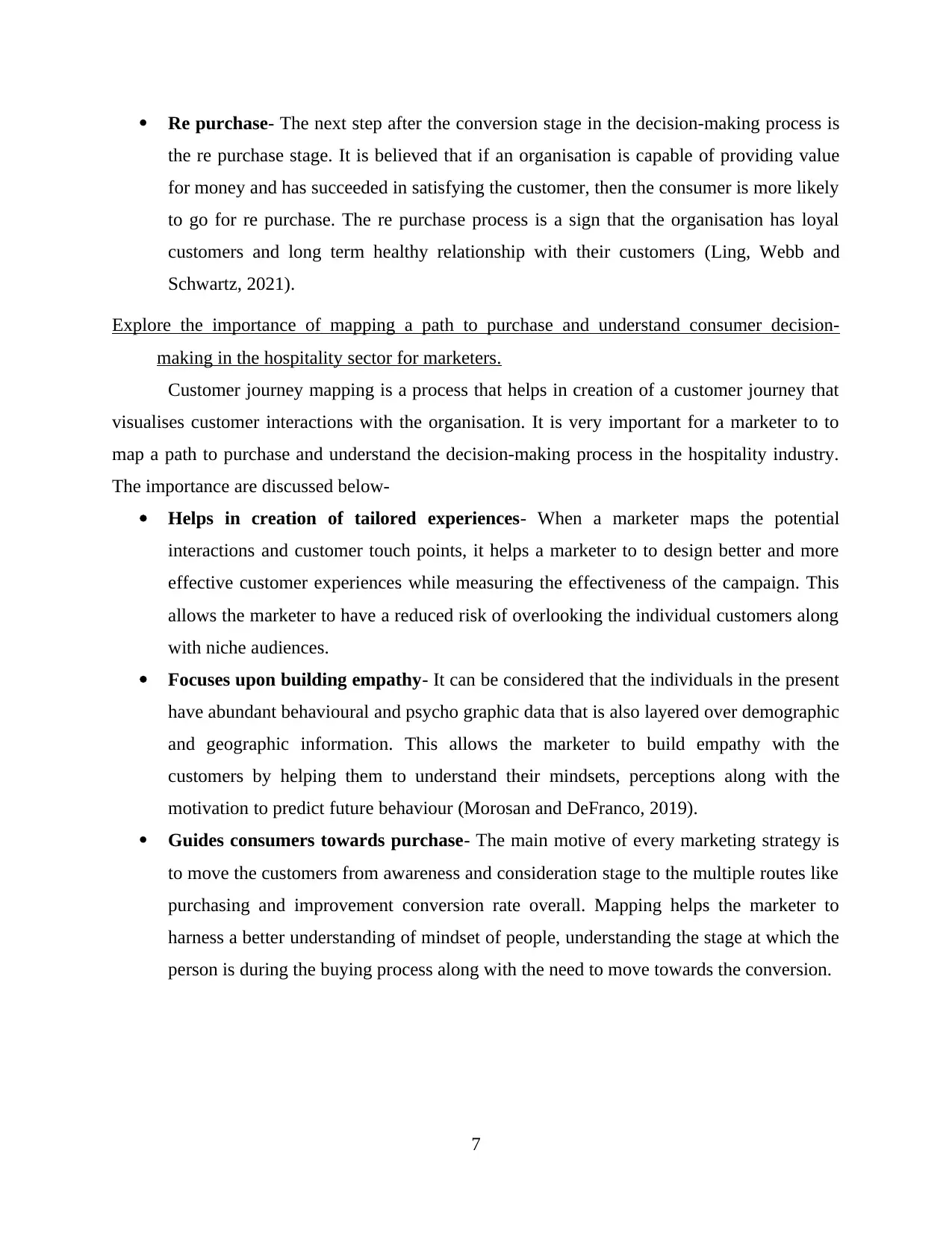
Re purchase- The next step after the conversion stage in the decision-making process is
the re purchase stage. It is believed that if an organisation is capable of providing value
for money and has succeeded in satisfying the customer, then the consumer is more likely
to go for re purchase. The re purchase process is a sign that the organisation has loyal
customers and long term healthy relationship with their customers (Ling, Webb and
Schwartz, 2021).
Explore the importance of mapping a path to purchase and understand consumer decision-
making in the hospitality sector for marketers.
Customer journey mapping is a process that helps in creation of a customer journey that
visualises customer interactions with the organisation. It is very important for a marketer to to
map a path to purchase and understand the decision-making process in the hospitality industry.
The importance are discussed below-
Helps in creation of tailored experiences- When a marketer maps the potential
interactions and customer touch points, it helps a marketer to to design better and more
effective customer experiences while measuring the effectiveness of the campaign. This
allows the marketer to have a reduced risk of overlooking the individual customers along
with niche audiences.
Focuses upon building empathy- It can be considered that the individuals in the present
have abundant behavioural and psycho graphic data that is also layered over demographic
and geographic information. This allows the marketer to build empathy with the
customers by helping them to understand their mindsets, perceptions along with the
motivation to predict future behaviour (Morosan and DeFranco, 2019).
Guides consumers towards purchase- The main motive of every marketing strategy is
to move the customers from awareness and consideration stage to the multiple routes like
purchasing and improvement conversion rate overall. Mapping helps the marketer to
harness a better understanding of mindset of people, understanding the stage at which the
person is during the buying process along with the need to move towards the conversion.
7
the re purchase stage. It is believed that if an organisation is capable of providing value
for money and has succeeded in satisfying the customer, then the consumer is more likely
to go for re purchase. The re purchase process is a sign that the organisation has loyal
customers and long term healthy relationship with their customers (Ling, Webb and
Schwartz, 2021).
Explore the importance of mapping a path to purchase and understand consumer decision-
making in the hospitality sector for marketers.
Customer journey mapping is a process that helps in creation of a customer journey that
visualises customer interactions with the organisation. It is very important for a marketer to to
map a path to purchase and understand the decision-making process in the hospitality industry.
The importance are discussed below-
Helps in creation of tailored experiences- When a marketer maps the potential
interactions and customer touch points, it helps a marketer to to design better and more
effective customer experiences while measuring the effectiveness of the campaign. This
allows the marketer to have a reduced risk of overlooking the individual customers along
with niche audiences.
Focuses upon building empathy- It can be considered that the individuals in the present
have abundant behavioural and psycho graphic data that is also layered over demographic
and geographic information. This allows the marketer to build empathy with the
customers by helping them to understand their mindsets, perceptions along with the
motivation to predict future behaviour (Morosan and DeFranco, 2019).
Guides consumers towards purchase- The main motive of every marketing strategy is
to move the customers from awareness and consideration stage to the multiple routes like
purchasing and improvement conversion rate overall. Mapping helps the marketer to
harness a better understanding of mindset of people, understanding the stage at which the
person is during the buying process along with the need to move towards the conversion.
7
Paraphrase This Document
Need a fresh take? Get an instant paraphrase of this document with our AI Paraphraser
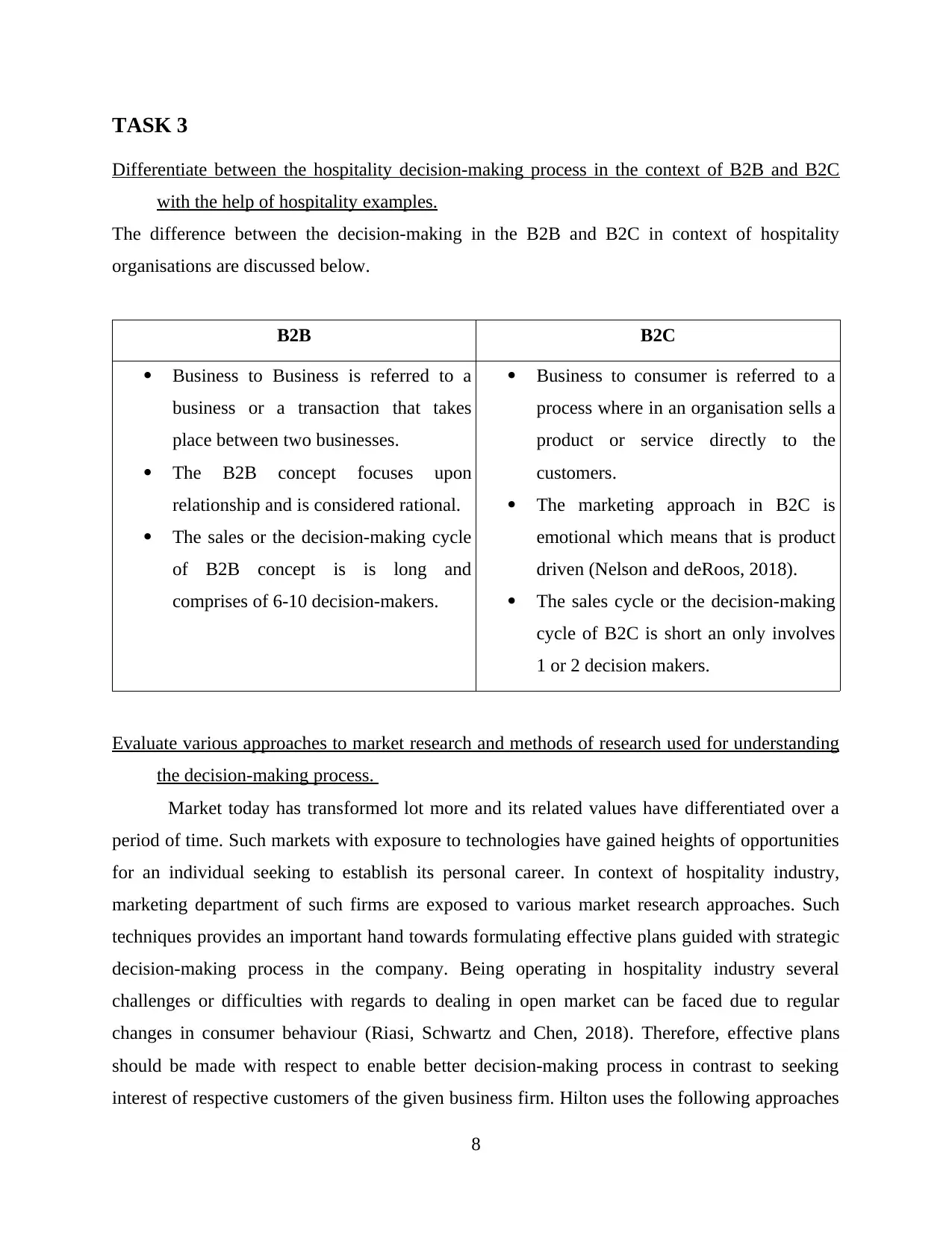
TASK 3
Differentiate between the hospitality decision-making process in the context of B2B and B2C
with the help of hospitality examples.
The difference between the decision-making in the B2B and B2C in context of hospitality
organisations are discussed below.
B2B B2C
Business to Business is referred to a
business or a transaction that takes
place between two businesses.
The B2B concept focuses upon
relationship and is considered rational.
The sales or the decision-making cycle
of B2B concept is is long and
comprises of 6-10 decision-makers.
Business to consumer is referred to a
process where in an organisation sells a
product or service directly to the
customers.
The marketing approach in B2C is
emotional which means that is product
driven (Nelson and deRoos, 2018).
The sales cycle or the decision-making
cycle of B2C is short an only involves
1 or 2 decision makers.
Evaluate various approaches to market research and methods of research used for understanding
the decision-making process.
Market today has transformed lot more and its related values have differentiated over a
period of time. Such markets with exposure to technologies have gained heights of opportunities
for an individual seeking to establish its personal career. In context of hospitality industry,
marketing department of such firms are exposed to various market research approaches. Such
techniques provides an important hand towards formulating effective plans guided with strategic
decision-making process in the company. Being operating in hospitality industry several
challenges or difficulties with regards to dealing in open market can be faced due to regular
changes in consumer behaviour (Riasi, Schwartz and Chen, 2018). Therefore, effective plans
should be made with respect to enable better decision-making process in contrast to seeking
interest of respective customers of the given business firm. Hilton uses the following approaches
8
Differentiate between the hospitality decision-making process in the context of B2B and B2C
with the help of hospitality examples.
The difference between the decision-making in the B2B and B2C in context of hospitality
organisations are discussed below.
B2B B2C
Business to Business is referred to a
business or a transaction that takes
place between two businesses.
The B2B concept focuses upon
relationship and is considered rational.
The sales or the decision-making cycle
of B2B concept is is long and
comprises of 6-10 decision-makers.
Business to consumer is referred to a
process where in an organisation sells a
product or service directly to the
customers.
The marketing approach in B2C is
emotional which means that is product
driven (Nelson and deRoos, 2018).
The sales cycle or the decision-making
cycle of B2C is short an only involves
1 or 2 decision makers.
Evaluate various approaches to market research and methods of research used for understanding
the decision-making process.
Market today has transformed lot more and its related values have differentiated over a
period of time. Such markets with exposure to technologies have gained heights of opportunities
for an individual seeking to establish its personal career. In context of hospitality industry,
marketing department of such firms are exposed to various market research approaches. Such
techniques provides an important hand towards formulating effective plans guided with strategic
decision-making process in the company. Being operating in hospitality industry several
challenges or difficulties with regards to dealing in open market can be faced due to regular
changes in consumer behaviour (Riasi, Schwartz and Chen, 2018). Therefore, effective plans
should be made with respect to enable better decision-making process in contrast to seeking
interest of respective customers of the given business firm. Hilton uses the following approaches
8
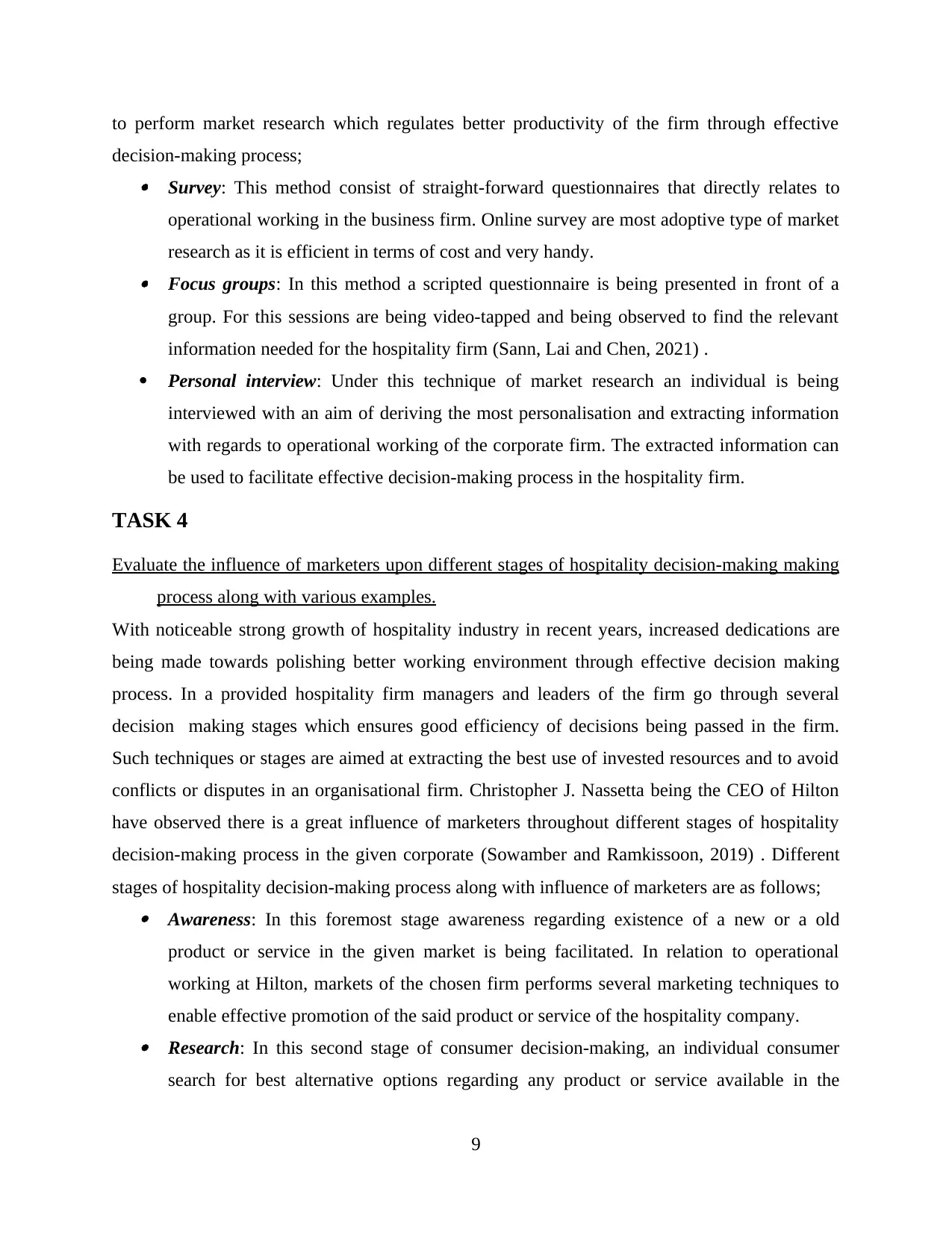
to perform market research which regulates better productivity of the firm through effective
decision-making process; Survey: This method consist of straight-forward questionnaires that directly relates to
operational working in the business firm. Online survey are most adoptive type of market
research as it is efficient in terms of cost and very handy. Focus groups: In this method a scripted questionnaire is being presented in front of a
group. For this sessions are being video-tapped and being observed to find the relevant
information needed for the hospitality firm (Sann, Lai and Chen, 2021) .
Personal interview: Under this technique of market research an individual is being
interviewed with an aim of deriving the most personalisation and extracting information
with regards to operational working of the corporate firm. The extracted information can
be used to facilitate effective decision-making process in the hospitality firm.
TASK 4
Evaluate the influence of marketers upon different stages of hospitality decision-making making
process along with various examples.
With noticeable strong growth of hospitality industry in recent years, increased dedications are
being made towards polishing better working environment through effective decision making
process. In a provided hospitality firm managers and leaders of the firm go through several
decision making stages which ensures good efficiency of decisions being passed in the firm.
Such techniques or stages are aimed at extracting the best use of invested resources and to avoid
conflicts or disputes in an organisational firm. Christopher J. Nassetta being the CEO of Hilton
have observed there is a great influence of marketers throughout different stages of hospitality
decision-making process in the given corporate (Sowamber and Ramkissoon, 2019) . Different
stages of hospitality decision-making process along with influence of marketers are as follows; Awareness: In this foremost stage awareness regarding existence of a new or a old
product or service in the given market is being facilitated. In relation to operational
working at Hilton, markets of the chosen firm performs several marketing techniques to
enable effective promotion of the said product or service of the hospitality company. Research: In this second stage of consumer decision-making, an individual consumer
search for best alternative options regarding any product or service available in the
9
decision-making process; Survey: This method consist of straight-forward questionnaires that directly relates to
operational working in the business firm. Online survey are most adoptive type of market
research as it is efficient in terms of cost and very handy. Focus groups: In this method a scripted questionnaire is being presented in front of a
group. For this sessions are being video-tapped and being observed to find the relevant
information needed for the hospitality firm (Sann, Lai and Chen, 2021) .
Personal interview: Under this technique of market research an individual is being
interviewed with an aim of deriving the most personalisation and extracting information
with regards to operational working of the corporate firm. The extracted information can
be used to facilitate effective decision-making process in the hospitality firm.
TASK 4
Evaluate the influence of marketers upon different stages of hospitality decision-making making
process along with various examples.
With noticeable strong growth of hospitality industry in recent years, increased dedications are
being made towards polishing better working environment through effective decision making
process. In a provided hospitality firm managers and leaders of the firm go through several
decision making stages which ensures good efficiency of decisions being passed in the firm.
Such techniques or stages are aimed at extracting the best use of invested resources and to avoid
conflicts or disputes in an organisational firm. Christopher J. Nassetta being the CEO of Hilton
have observed there is a great influence of marketers throughout different stages of hospitality
decision-making process in the given corporate (Sowamber and Ramkissoon, 2019) . Different
stages of hospitality decision-making process along with influence of marketers are as follows; Awareness: In this foremost stage awareness regarding existence of a new or a old
product or service in the given market is being facilitated. In relation to operational
working at Hilton, markets of the chosen firm performs several marketing techniques to
enable effective promotion of the said product or service of the hospitality company. Research: In this second stage of consumer decision-making, an individual consumer
search for best alternative options regarding any product or service available in the
9
⊘ This is a preview!⊘
Do you want full access?
Subscribe today to unlock all pages.

Trusted by 1+ million students worldwide
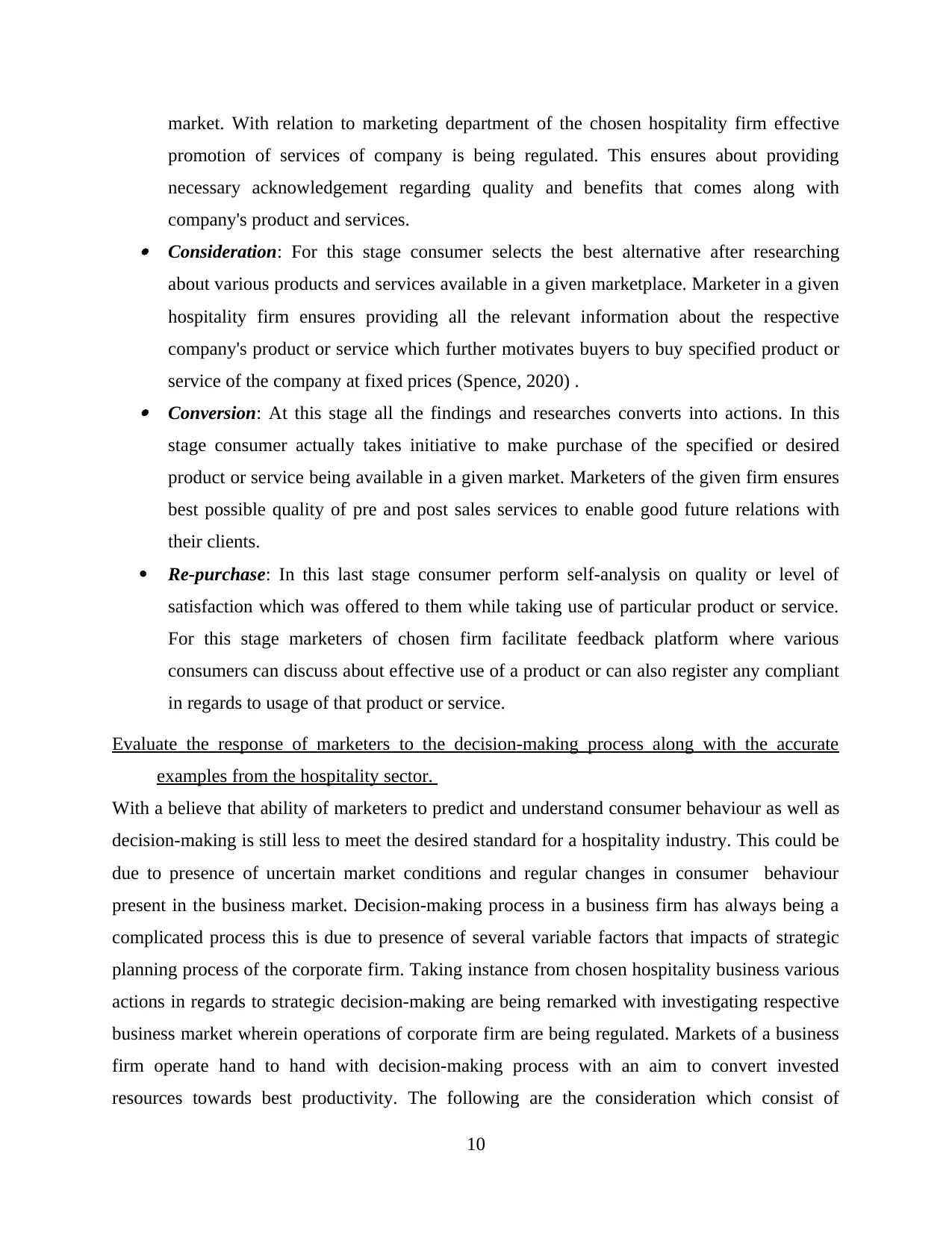
market. With relation to marketing department of the chosen hospitality firm effective
promotion of services of company is being regulated. This ensures about providing
necessary acknowledgement regarding quality and benefits that comes along with
company's product and services. Consideration: For this stage consumer selects the best alternative after researching
about various products and services available in a given marketplace. Marketer in a given
hospitality firm ensures providing all the relevant information about the respective
company's product or service which further motivates buyers to buy specified product or
service of the company at fixed prices (Spence, 2020) . Conversion: At this stage all the findings and researches converts into actions. In this
stage consumer actually takes initiative to make purchase of the specified or desired
product or service being available in a given market. Marketers of the given firm ensures
best possible quality of pre and post sales services to enable good future relations with
their clients.
Re-purchase: In this last stage consumer perform self-analysis on quality or level of
satisfaction which was offered to them while taking use of particular product or service.
For this stage marketers of chosen firm facilitate feedback platform where various
consumers can discuss about effective use of a product or can also register any compliant
in regards to usage of that product or service.
Evaluate the response of marketers to the decision-making process along with the accurate
examples from the hospitality sector.
With a believe that ability of marketers to predict and understand consumer behaviour as well as
decision-making is still less to meet the desired standard for a hospitality industry. This could be
due to presence of uncertain market conditions and regular changes in consumer behaviour
present in the business market. Decision-making process in a business firm has always being a
complicated process this is due to presence of several variable factors that impacts of strategic
planning process of the corporate firm. Taking instance from chosen hospitality business various
actions in regards to strategic decision-making are being remarked with investigating respective
business market wherein operations of corporate firm are being regulated. Markets of a business
firm operate hand to hand with decision-making process with an aim to convert invested
resources towards best productivity. The following are the consideration which consist of
10
promotion of services of company is being regulated. This ensures about providing
necessary acknowledgement regarding quality and benefits that comes along with
company's product and services. Consideration: For this stage consumer selects the best alternative after researching
about various products and services available in a given marketplace. Marketer in a given
hospitality firm ensures providing all the relevant information about the respective
company's product or service which further motivates buyers to buy specified product or
service of the company at fixed prices (Spence, 2020) . Conversion: At this stage all the findings and researches converts into actions. In this
stage consumer actually takes initiative to make purchase of the specified or desired
product or service being available in a given market. Marketers of the given firm ensures
best possible quality of pre and post sales services to enable good future relations with
their clients.
Re-purchase: In this last stage consumer perform self-analysis on quality or level of
satisfaction which was offered to them while taking use of particular product or service.
For this stage marketers of chosen firm facilitate feedback platform where various
consumers can discuss about effective use of a product or can also register any compliant
in regards to usage of that product or service.
Evaluate the response of marketers to the decision-making process along with the accurate
examples from the hospitality sector.
With a believe that ability of marketers to predict and understand consumer behaviour as well as
decision-making is still less to meet the desired standard for a hospitality industry. This could be
due to presence of uncertain market conditions and regular changes in consumer behaviour
present in the business market. Decision-making process in a business firm has always being a
complicated process this is due to presence of several variable factors that impacts of strategic
planning process of the corporate firm. Taking instance from chosen hospitality business various
actions in regards to strategic decision-making are being remarked with investigating respective
business market wherein operations of corporate firm are being regulated. Markets of a business
firm operate hand to hand with decision-making process with an aim to convert invested
resources towards best productivity. The following are the consideration which consist of
10
Paraphrase This Document
Need a fresh take? Get an instant paraphrase of this document with our AI Paraphraser
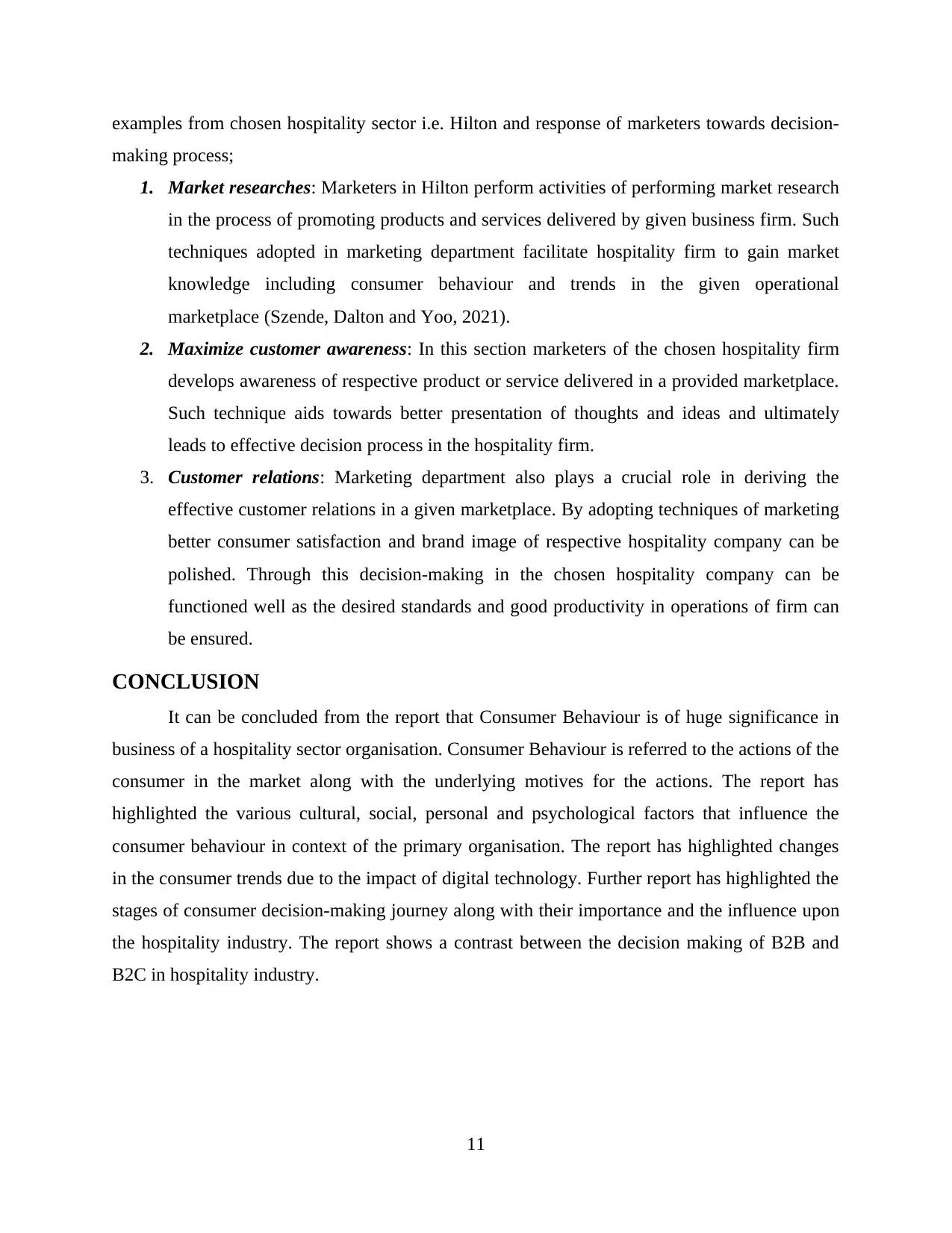
examples from chosen hospitality sector i.e. Hilton and response of marketers towards decision-
making process;
1. Market researches: Marketers in Hilton perform activities of performing market research
in the process of promoting products and services delivered by given business firm. Such
techniques adopted in marketing department facilitate hospitality firm to gain market
knowledge including consumer behaviour and trends in the given operational
marketplace (Szende, Dalton and Yoo, 2021).
2. Maximize customer awareness: In this section marketers of the chosen hospitality firm
develops awareness of respective product or service delivered in a provided marketplace.
Such technique aids towards better presentation of thoughts and ideas and ultimately
leads to effective decision process in the hospitality firm.
3. Customer relations: Marketing department also plays a crucial role in deriving the
effective customer relations in a given marketplace. By adopting techniques of marketing
better consumer satisfaction and brand image of respective hospitality company can be
polished. Through this decision-making in the chosen hospitality company can be
functioned well as the desired standards and good productivity in operations of firm can
be ensured.
CONCLUSION
It can be concluded from the report that Consumer Behaviour is of huge significance in
business of a hospitality sector organisation. Consumer Behaviour is referred to the actions of the
consumer in the market along with the underlying motives for the actions. The report has
highlighted the various cultural, social, personal and psychological factors that influence the
consumer behaviour in context of the primary organisation. The report has highlighted changes
in the consumer trends due to the impact of digital technology. Further report has highlighted the
stages of consumer decision-making journey along with their importance and the influence upon
the hospitality industry. The report shows a contrast between the decision making of B2B and
B2C in hospitality industry.
11
making process;
1. Market researches: Marketers in Hilton perform activities of performing market research
in the process of promoting products and services delivered by given business firm. Such
techniques adopted in marketing department facilitate hospitality firm to gain market
knowledge including consumer behaviour and trends in the given operational
marketplace (Szende, Dalton and Yoo, 2021).
2. Maximize customer awareness: In this section marketers of the chosen hospitality firm
develops awareness of respective product or service delivered in a provided marketplace.
Such technique aids towards better presentation of thoughts and ideas and ultimately
leads to effective decision process in the hospitality firm.
3. Customer relations: Marketing department also plays a crucial role in deriving the
effective customer relations in a given marketplace. By adopting techniques of marketing
better consumer satisfaction and brand image of respective hospitality company can be
polished. Through this decision-making in the chosen hospitality company can be
functioned well as the desired standards and good productivity in operations of firm can
be ensured.
CONCLUSION
It can be concluded from the report that Consumer Behaviour is of huge significance in
business of a hospitality sector organisation. Consumer Behaviour is referred to the actions of the
consumer in the market along with the underlying motives for the actions. The report has
highlighted the various cultural, social, personal and psychological factors that influence the
consumer behaviour in context of the primary organisation. The report has highlighted changes
in the consumer trends due to the impact of digital technology. Further report has highlighted the
stages of consumer decision-making journey along with their importance and the influence upon
the hospitality industry. The report shows a contrast between the decision making of B2B and
B2C in hospitality industry.
11
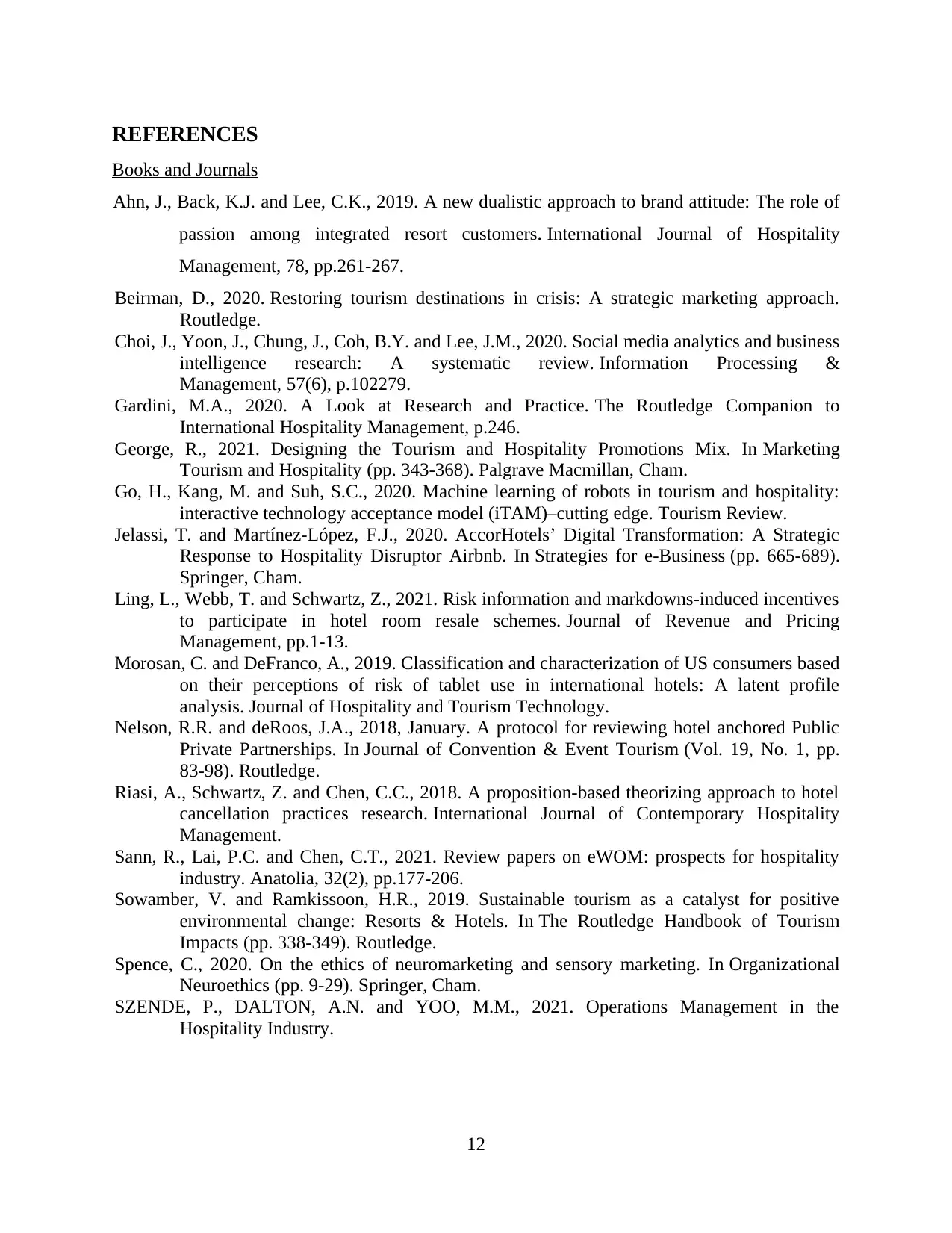
REFERENCES
Books and Journals
Ahn, J., Back, K.J. and Lee, C.K., 2019. A new dualistic approach to brand attitude: The role of
passion among integrated resort customers. International Journal of Hospitality
Management, 78, pp.261-267.
Beirman, D., 2020. Restoring tourism destinations in crisis: A strategic marketing approach.
Routledge.
Choi, J., Yoon, J., Chung, J., Coh, B.Y. and Lee, J.M., 2020. Social media analytics and business
intelligence research: A systematic review. Information Processing &
Management, 57(6), p.102279.
Gardini, M.A., 2020. A Look at Research and Practice. The Routledge Companion to
International Hospitality Management, p.246.
George, R., 2021. Designing the Tourism and Hospitality Promotions Mix. In Marketing
Tourism and Hospitality (pp. 343-368). Palgrave Macmillan, Cham.
Go, H., Kang, M. and Suh, S.C., 2020. Machine learning of robots in tourism and hospitality:
interactive technology acceptance model (iTAM)–cutting edge. Tourism Review.
Jelassi, T. and Martínez-López, F.J., 2020. AccorHotels’ Digital Transformation: A Strategic
Response to Hospitality Disruptor Airbnb. In Strategies for e-Business (pp. 665-689).
Springer, Cham.
Ling, L., Webb, T. and Schwartz, Z., 2021. Risk information and markdowns-induced incentives
to participate in hotel room resale schemes. Journal of Revenue and Pricing
Management, pp.1-13.
Morosan, C. and DeFranco, A., 2019. Classification and characterization of US consumers based
on their perceptions of risk of tablet use in international hotels: A latent profile
analysis. Journal of Hospitality and Tourism Technology.
Nelson, R.R. and deRoos, J.A., 2018, January. A protocol for reviewing hotel anchored Public
Private Partnerships. In Journal of Convention & Event Tourism (Vol. 19, No. 1, pp.
83-98). Routledge.
Riasi, A., Schwartz, Z. and Chen, C.C., 2018. A proposition-based theorizing approach to hotel
cancellation practices research. International Journal of Contemporary Hospitality
Management.
Sann, R., Lai, P.C. and Chen, C.T., 2021. Review papers on eWOM: prospects for hospitality
industry. Anatolia, 32(2), pp.177-206.
Sowamber, V. and Ramkissoon, H.R., 2019. Sustainable tourism as a catalyst for positive
environmental change: Resorts & Hotels. In The Routledge Handbook of Tourism
Impacts (pp. 338-349). Routledge.
Spence, C., 2020. On the ethics of neuromarketing and sensory marketing. In Organizational
Neuroethics (pp. 9-29). Springer, Cham.
SZENDE, P., DALTON, A.N. and YOO, M.M., 2021. Operations Management in the
Hospitality Industry.
12
Books and Journals
Ahn, J., Back, K.J. and Lee, C.K., 2019. A new dualistic approach to brand attitude: The role of
passion among integrated resort customers. International Journal of Hospitality
Management, 78, pp.261-267.
Beirman, D., 2020. Restoring tourism destinations in crisis: A strategic marketing approach.
Routledge.
Choi, J., Yoon, J., Chung, J., Coh, B.Y. and Lee, J.M., 2020. Social media analytics and business
intelligence research: A systematic review. Information Processing &
Management, 57(6), p.102279.
Gardini, M.A., 2020. A Look at Research and Practice. The Routledge Companion to
International Hospitality Management, p.246.
George, R., 2021. Designing the Tourism and Hospitality Promotions Mix. In Marketing
Tourism and Hospitality (pp. 343-368). Palgrave Macmillan, Cham.
Go, H., Kang, M. and Suh, S.C., 2020. Machine learning of robots in tourism and hospitality:
interactive technology acceptance model (iTAM)–cutting edge. Tourism Review.
Jelassi, T. and Martínez-López, F.J., 2020. AccorHotels’ Digital Transformation: A Strategic
Response to Hospitality Disruptor Airbnb. In Strategies for e-Business (pp. 665-689).
Springer, Cham.
Ling, L., Webb, T. and Schwartz, Z., 2021. Risk information and markdowns-induced incentives
to participate in hotel room resale schemes. Journal of Revenue and Pricing
Management, pp.1-13.
Morosan, C. and DeFranco, A., 2019. Classification and characterization of US consumers based
on their perceptions of risk of tablet use in international hotels: A latent profile
analysis. Journal of Hospitality and Tourism Technology.
Nelson, R.R. and deRoos, J.A., 2018, January. A protocol for reviewing hotel anchored Public
Private Partnerships. In Journal of Convention & Event Tourism (Vol. 19, No. 1, pp.
83-98). Routledge.
Riasi, A., Schwartz, Z. and Chen, C.C., 2018. A proposition-based theorizing approach to hotel
cancellation practices research. International Journal of Contemporary Hospitality
Management.
Sann, R., Lai, P.C. and Chen, C.T., 2021. Review papers on eWOM: prospects for hospitality
industry. Anatolia, 32(2), pp.177-206.
Sowamber, V. and Ramkissoon, H.R., 2019. Sustainable tourism as a catalyst for positive
environmental change: Resorts & Hotels. In The Routledge Handbook of Tourism
Impacts (pp. 338-349). Routledge.
Spence, C., 2020. On the ethics of neuromarketing and sensory marketing. In Organizational
Neuroethics (pp. 9-29). Springer, Cham.
SZENDE, P., DALTON, A.N. and YOO, M.M., 2021. Operations Management in the
Hospitality Industry.
12
⊘ This is a preview!⊘
Do you want full access?
Subscribe today to unlock all pages.

Trusted by 1+ million students worldwide
1 out of 12
Related Documents
Your All-in-One AI-Powered Toolkit for Academic Success.
+13062052269
info@desklib.com
Available 24*7 on WhatsApp / Email
![[object Object]](/_next/static/media/star-bottom.7253800d.svg)
Unlock your academic potential
Copyright © 2020–2025 A2Z Services. All Rights Reserved. Developed and managed by ZUCOL.

